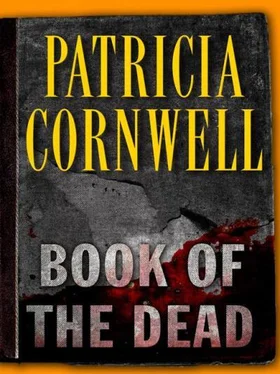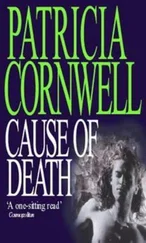“Yes. And he knows we’ve got a problem with your gold coin,” Lucy says, just getting to that. “DNA on it and the chain are the Sandman’s, too, and that places him behind your house the night you and Bull found the gun in the alley. I might ask what that implies about Bull. The necklace could have been his. I’ve asked that question before. We don’t have Bull’s DNA to tell us.”
“That he’s the Sandman?” Scarpetta doesn’t believe it for a minute.
“I’m just saying we don’t have his DNA,” Lucy says.
“And the gun? The cartridges?” Scarpetta asks.
“Not the Sandman’s DNA on any of those swabs,” Lucy says. “But that doesn’t necessarily mean anything. His DNA on a necklace is one thing. Leaving it on a gun is another, because he might have gotten the gun from someone else. He might have been careful leaving his DNA or his fingerprints on it because of the story he gave — that the asshole who threatened you is the one who dropped it, when we can’t swear that guy ever came near your house. It’s Bull’s word, because it was unwitnessed.”
“You’re suggesting that Bull — assuming he’s the Sandman, which I don’t believe — might have deliberately, quote, lost the gun. But didn’t mean to lose his necklace,” Scarpetta says. “That doesn’t make a whole lot of sense for two reasons. Why did his necklace break? And secondly, if he didn’t know it broke and fell off until he found it, why would he draw my attention to it? Why not just tuck it into his pocket? I could add the third rather strange thought of him having a gold coin necklace to begin with that is reminiscent of the silver-dollar necklace Shandy gave Marino.”
“It sure would be nice to get Bull’s prints,” Aaron says. “It sure would be nice to swab him. It sure bothers me he seems to have disappeared.”
“That’s it for now,” Lucy says. “We’re working on cloning him. Going to create a copy of him in a petri dish so we know who it is,” she says drolly.
“I remember not so long ago waiting weeks, months for DNA.” Scarpetta rues those days, painfully reminded of how many people were brutalized and murdered because a violent offender couldn’t be identified quickly.
“Ceiling’s at three thousand feet, vis three miles,” Lucy says to Scarpetta. “We’re VFR. I’ll meet you at the airport.”
Inside Marino’s office, his bowling trophies are silhouetted against the old plaster wall, and there is an emptiness in the air.
Benton shuts the door and doesn’t turn on the light. He sits in the dark at Marino’s desk and for the first time realizes that no matter what he’s said, he’s never taken Marino seriously or been particularly inclusive. If he’s truthful about it, he’s always thought of him as Scarpetta’s sidekick — an ignorant, bigoted, crass cop who doesn’t belong in the modern world, and as a result of that and any number of other factors, is unpleasant to be around and not entirely helpful. Benton has endured him. He’s underestimated him in some departments and understood him perfectly fine in others, but failed to recognize the obvious. As he sits at Marino’s little-used desk and stares out the window at the lights of Charleston, he wishes he had paid more attention to him, to everything. What he’s needed to know is in his reach and has been.
The time in Venice is almost four o’clock in the morning. It’s no wonder Paulo Maroni left McLean, and now has left Rome.
“Pronto,” he answers his phone.
“Were you asleep?” Benton asks.
“If you cared, you wouldn’t be calling. What’s going on that you need to call me at this unseemly hour? Some development in the case, I hope?”
“Not a good one, necessarily.”
“Then what?” Dr. Maroni’s voice has an undercurrent of reluctance, or maybe it’s resignation that Benton hears.
“The patient you had.”
“I’ve told you about him.”
“You’ve told me what you wanted to tell me, Paulo.”
“What more could I help you with?” Dr. Maroni says. “In addition to what I’ve said, you’ve read my notes. I’ve been a friend and not asked you how that happened. I haven’t blamed Lucy, for example.”
“You might want to blame yourself. Do you think I haven’t figured out that you wanted us to access your patient’s file? You left it on the hospital network. You left file-sharing on, meaning anybody who could figure out where it was could get into it. For Lucy, yes, it would be no effort. For you, it was no mistake. You’re too smart for that.”
“And so you admit Lucy violated my confidential electronic files.”
“You knew we’d want to see your patient notes. So you arranged it before you left for Rome. Which was earlier than you planned, by the way. Conveniently, right after you learned that Dr. Self was about to be a patient at McLean. You allowed it. She couldn’t have been admitted at the Pavilion if you hadn’t allowed it.”
“She was manic.”
“She was calculating. Does she know?”
“Know what?”
“Don’t lie to me.”
“It’s interesting you would think I might,” Dr. Maroni says.
“I’ve talked to Dr. Self’s mother.”
“Is she still such an unpleasant woman?”
“I imagine she hasn’t changed,” Benton says.
“People like her rarely do. Sometimes they burn out as they get older. In her case, she’s likely worse. As Marilyn will be. As she already is.”
“I imagine she hasn’t changed much, either. Although her mother blames her daughter’s personality disorder on you,” Benton says.
“And we know that’s not what happens. She doesn’t have a Paulo-induced personality disorder. She came by it honestly.”
“This isn’t amusing.”
“Certainly, it isn’t.”
“Where is he?” Benton asks. “And you know exactly who I mean.”
“In those long-ago days, a person was still a minor at age sixteen. Do you understand?”
“And you were twenty-nine.”
“Twenty-two. Gladys would insult me by making me that much older. I’m sure you can understand why I had to leave,” Dr. Maroni says.
“Leave or flee? If you ask Dr. Self, it’s the latter when she describes your hasty exit of several weeks ago. You were inappropriate with her and fled to Italy. Where is he, Paulo? Don’t do this to yourself, and don’t do it to anyone else.”
“Would you believe it if I told you she was inappropriate with me?”
“It doesn’t matter. That’s not what I give a goddamn about. Where is he?” Benton says.
“Statutory rape is what they would have called it, you know. Her mother threatened it and, indeed, wanted to believe Marilyn wouldn’t have sex with a man she happened to meet during spring break. She was so beautiful and exciting, and offered her virginity, and I took it. I did love her. I did flee from her, this is true. I recognized she was toxic way back then. But I didn’t return to Italy as I led her to believe. I returned to Harvard to finish medical school, and she never knew I was still in America.”
“We’ve done DNA, Paulo.”
“After the baby was born, she still didn’t know. I wrote her letters, you see. And had them mailed from Rome.”
“Where is he, Paulo? Where’s your son?”
“I begged her not to get an abortion, because it’s against my religious beliefs. She said if she had the baby, I would have to raise it. And I did the best I could with what turned out to be a miscreant, a devil with a high IQ. He spent most of his life in Italy, and some of his time with her until he turned eighteen. He’s the one who is twenty-nine. Perhaps Gladys was playing her usual games…. Well. In many ways, he belongs to neither of us and hates both of us. Marilyn more than me, although when I saw him last, I feared for my safety. Perhaps my life. I thought he was going to attack me with a piece of ancient sculpture, but I managed to soothe him.”
Читать дальше












